Normal Organoid Culture Medium
- Human Colonic Organoid Differentiation Medium
- Human Colonic Organoid Expansion Medium
- Human Intestinal Organoid Kit
- Human Gastric Organoid Growth Medium
- Human Airway Organoid Growth Medium
- Human Liver Ductal Organoid Differentiation Kit
- Human Liver Ductal Organoid Expansion Medium
- Human Mammary Glands Organoid Kit
- Mouse Airway Organoid Growth Medium
- Mouse Intestinal Organoid Kit
- Mouse Colonic Organoid Growth Medium
- Mouse Liver Ductal Organoid Differentiation Kit
- Mouse Liver Ductal Organoid Expansion Medium
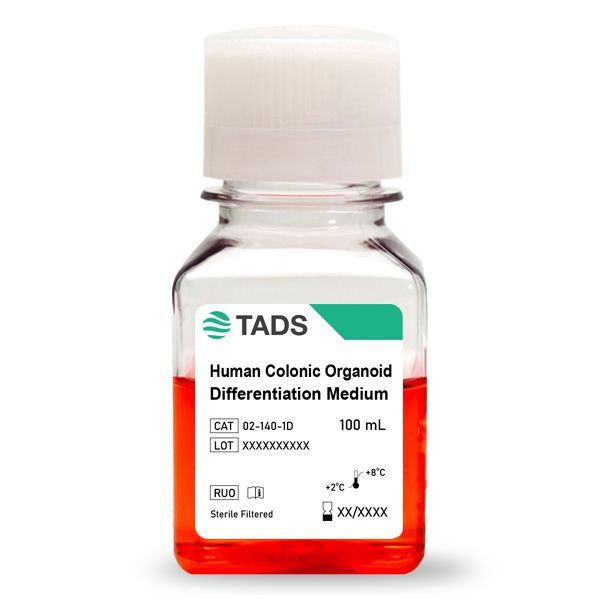
Human Colonic Organoid Differentiation Medium
02-140-1E / 02-140-1D
500 mL / 100 mL
TADS Human Colonic Organoid Differentiation Medium is a complete medium designed for the differentiation of human colonic organoids. Under the culture conditions provided by this differentiation medium, colonic stem cells and progenitor cells within the human colonic organoids gradually differentiate into various cell types, including absorptive cells, secretory cells, and goblet cells. This differentiation process is of significant value for studying colonic development, physiological functions, and the mechanisms underlying related diseases.
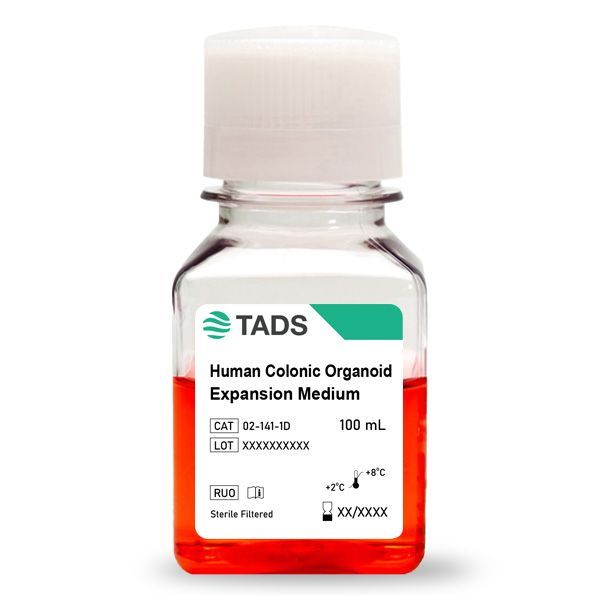
Human Colonic Organoid Expansion Medium
02-141-1E / 02-141-1D
500 mL / 100 mL
TADS Human Colonic Organoid Expansion Medium is a complete medium designed for the expansion of human colonic organoids. During expansion, the organoids primarily consist of colonic stem cells and progenitor cells. Colonic organoids replicate the characteristics of the in vivo colonic epithelium, including self-renewal and differentiation capabilities, tissue structure, cell types, and functions. As such, they serve as an ideal in vitro model for human colonic research.

Human Intestinal Organoid Kit
02-142-1E / 02-142-1D
500 mL / 100 mL
TADS Human Intestinal Organoid Kit is a chemically defined cell culture medium for establishment and maintenance of human intestinal organoids derived from adult stem cells. Self renewal of the intestinal epithelium is driven by the proliferation of stem cells and their progenitors located in crypts. Human intestinal organoids display all hallmarks of the intestinal epithelium in terms of architecture, cell type composition, and self-renewal dynamics, therefore hold great promise for unprecedented studies of human intestinal development and disease, human intestinal organoids may also have applications in regenerative biology through ex vivo expansion of the intestinal epithelium.
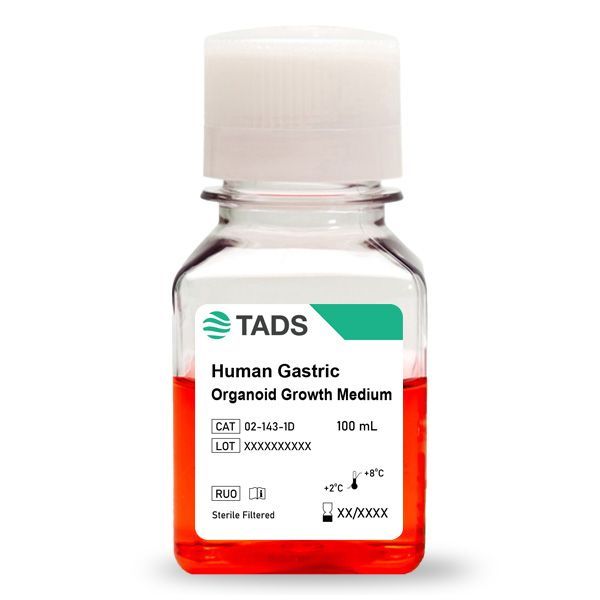
Human Gastric Organoid Growth Medium
02-143-1E / 02-143-1D
500 mL / 100 mL
TADS Human Gastric Organoid Growth Medium is a chemically defined cell culture medium designed for the establishment and maintenance of human gastric organoids derived from adult stem cells. The self-renewal of gastric epithelial cells is driven by the proliferation of stem cells and their progenitor cells. These organoids exhibit all the key features of gastric epithelium in terms of architecture, cellular composition, and self-renewal dynamics, making them an invaluable model for studying gastric development and disease mechanisms.
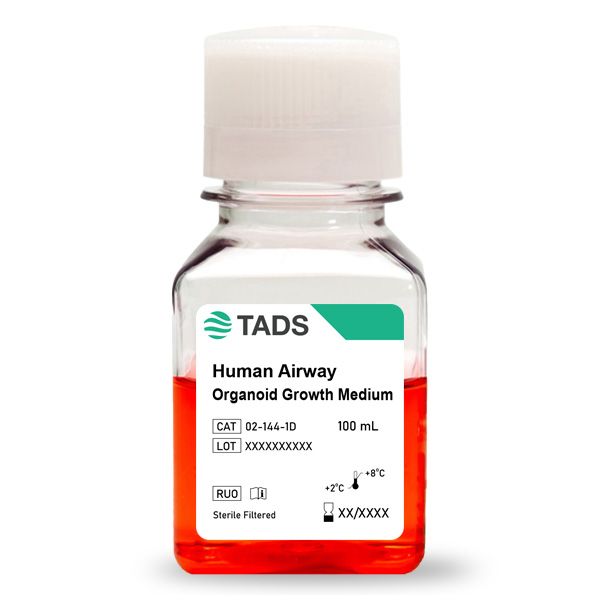
Human Airway Organoid Growth Medium
02-144-1E / 02-144-1D
500 mL / 100 mL
TADS Human Airway Organoid Growth Medium is a chemically defined cell culture medium designed for the establishment and maintenance of human airway organoids derived from tracheal stem cells. The self-renewal of airway epithelium is driven by the proliferation of basal stem cells. Human airway organoids consist of basal cells, ciliated cells, secretory cells, and a small number of neuroendocrine cells. These organoids exhibit all the key features of airway epithelium in terms of architecture, cellular composition, and self-renewal dynamics, making them an invaluable model for studying airway development and disease mechanisms.

Human Liver Ductal Organoid Differentiation Kit
02-148-1E / 02-148-1D
500 mL / 100 mL
TADS Human Liver Ductal Organoid Differentiation Kit is a chemically defined cell culture medium designed for the establishment and cultivation of human liver ductal organoids derived from adult stem cells. The self-renewing epithelial cells of the liver ducts are driven by the proliferation of stem and progenitor cells located in the liver. Liver ductal organoids exhibit characteristics of real organs due to their structural, cellular composition, and self-renewal dynamics. Moreover, liver ductal organoids can be induced into hepatocyte-like cells using differentiation media, providing an invaluable model for studying human liver development and disease.
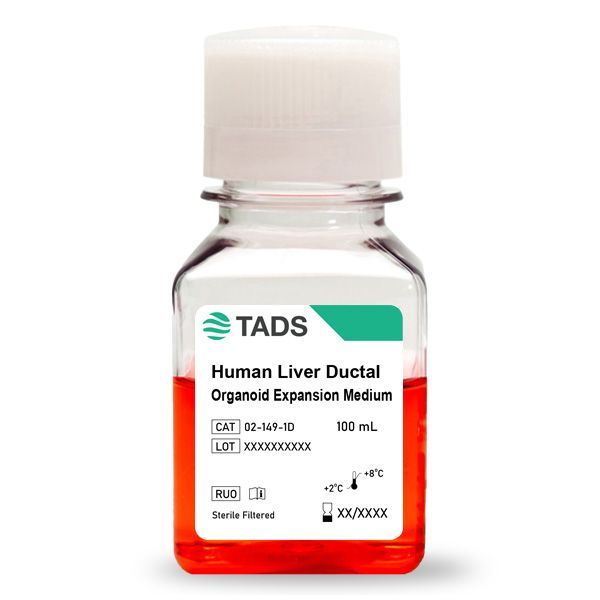
Human Liver Ductal Organoid Expansion Medium
02-149-1E / 02-149-1D
500 mL / 100 mL
TADS Human Liver Ductal Organoid Expansion Medium is a chemically defined cell culture medium designed for the establishment and cultivation of human liver ductal organoids derived from adult stem cells. The self-renewing epithelial cells of the liver ducts are driven by the expansion of liver-resident stem cells and their progenitor cells. Liver ductal organoids exhibit characteristics of real organs, including epithelial structure, cellular composition and self-renewal dynamics. As such, liver ductal organoids can be induced to generate hepatocyte-like cells in differentiation media, providing an unprecedented model for studying human liver development and diseases
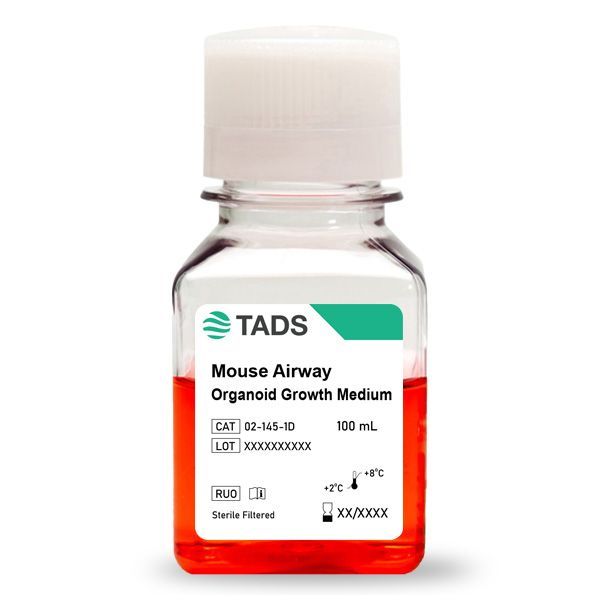
Mouse Airway Organoid Growth Medium
02-145-1E / 02-145-1D
500 mL / 100 mL
TADS Mouse Airway Organoid Growth Medium is a chemically defined cell culture medium designed for the establishment and maintenance of Mouse airway organoids derived from tracheal stem cells. The self-renewal of airway epithelium is driven by the proliferation of basal stem cells. Mouse airway organoids consist of basal cells, ciliated cells, secretory cells, and a small number of neuroendocrine cells. These organoids exhibit all the key features of airway epithelium in terms of architecture, cellular composition, and self-renewal dynamics, making them an invaluable model for studying airway development and disease mechanisms.

Mouse Intestinal Organoid Kit
02-146-1E / 02-146-1D
500 mL / 100 mL
TADS Mouse Intestine Organoid Kit is a chemically defined cell culture medium for establishment and maintenance of mouse intestinal organoids derived from adult stem cells. Self-renewal of the intestinal epithelium is driven by the proliferation of stem cells and their progenitors located in crypts. Mouse intestinal organoids display all hallmarks of the intestinal epithelium in terms of architecture, cell type composition, and self-renewal dynamics, therefore hold great promise for studying of mouse intestinal development and disease, mouse intestinal organoids may also have applications in regenerative biology through ex vivo expansion of the intestinal epithelium.

Mouse Colonic Organoid Growth Medium
02-147-1E / 02-147-1D
500 mL / 100 mL
TADS Mouse Colonic Organoid Growth Medium is a complete medium designed for the expansion and differentiation of mouse colonic organoids. During expansion, the organoids primarily consist of colonic stem cells and progenitor cells. After differentiation, the organoids are composed of colonic absorptive cells, goblet cells, and a small number of enteroendocrine cells. Colonic organoids replicate the characteristics of the in vivo colonic epithelium, including self-renewal and differentiation capabilities, tissue structure, cell types, and functions. As such, they serve as an ideal in vitro model for mouse colonic research.

Mouse Liver Ductal Organoid Differentiation Kit
02-151-1E / 02-151-1D
500 mL / 100 mL
TADS Pancreatic Cancer Organoid Kit is a chemically defined cell culture medium used to establish and maintain human lung adenocarcinoma organoids. Patient-derived tumor organoids retain the genomic and pathological characteristics of the original tumor, thus having great prospects in medical research and precision medicine.

Mouse Liver Ductal Organoid Expansion Medium
02-152-1E / 02-152-1D
500 mL / 100 mL
TADS Mouse Liver Ductal Organoid Expansion Medium is a chemically defined cell culture medium designed for the establishment and cultivation of mouse liver ductal organoids derived from adult stem cells. The self-renewing epithelial cells of the liver ducts are driven by the expansion of liver-resident stem cells and their progenitor cells. Liver ductal organoids exhibit characteristics of real organs, including epithelial structure, cellular composition and self-renewal dynamics. As such, liver ductal organoids can be induced to generate hepatocyte-like cells in differentiation media, providing an unprecedented model for studying mouse liver development and diseases.


